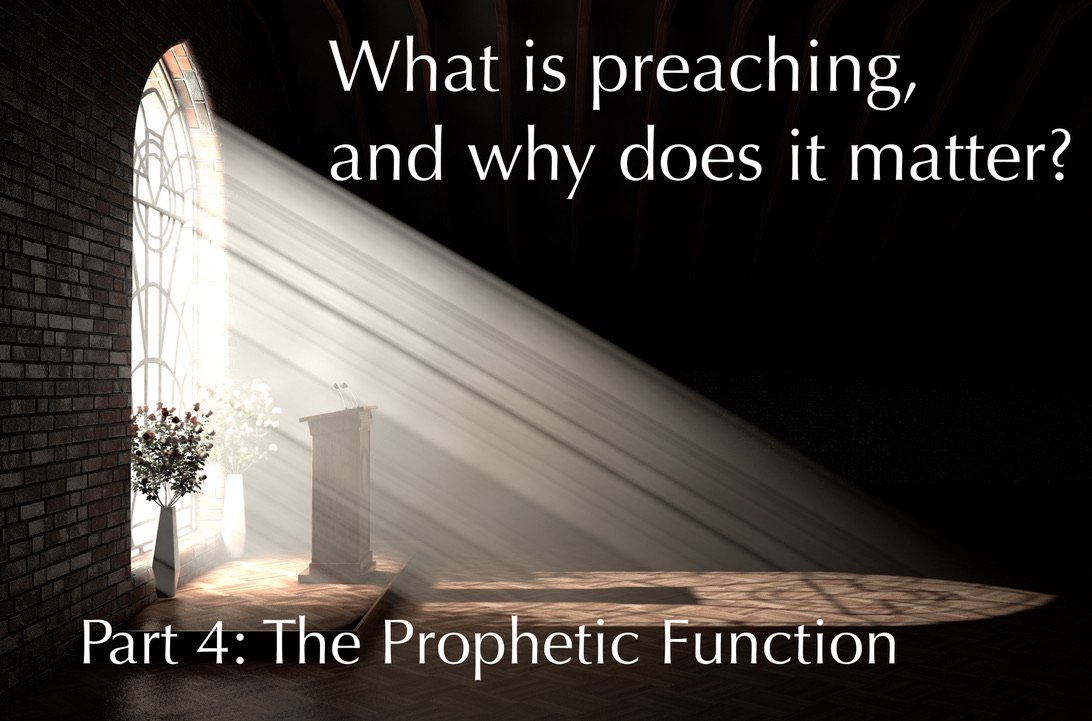
Preaching Names Our Brokenness
This is the prophetic function of preaching: naming our brokenness. Peeling back the layers of our denial, our deflection, and our self-deception to give a name to the self-destructive inclination of our hands, our heads, and our hearts. Why does this matter? Because only when our rebellion is named can we repent of it. And only when we repent can we experience redemption. And only through redemption can we enjoy restoration. Naming our brokenness is the at the trailhead to the only possible path to wholeness, healing, and grace.

Towards A “Big Story” Homiletic
How do we go about intentionally establishing a ministry of “big story preaching?” We need a “big story homiletic” that could secure a metanarrative thread in every sermon. Such a homiletic will need to weave the big story into its theology, its hermeneutic, its cultural engagement, and its application of the text.

Review: Biblical Theology and Preaching
Must Christ be preached from every text? Is it realistic, or even right, to expect that every sermon should proclaim the Gospel? Can you be true to the original intent of the human author behind the text while also tying it to the grand intent of the divine author over the text? Graeme Goldsworthy would answer each of these questions with a resounding “yes!”

What does the “Big Story” Do?
We are all shaped by a story. The question is, which story will it be? For disciples of Jesus, this life-shaping story is the Gospel. Before we turn to specifics of how to integrate the “big story” into our preaching, we should ask another question: What are the goals of Big Story Preaching?
How do we expect the grand narrative of the Scriptures to form disciples of Jesus? I will focus on four ways: The big story defines identity, shapes worldview, informs and guides mission, and creates community.

“Big Story” Preaching: Making Disciples in a Post-Christian World
How do we make disciples in a post-Christian world?” I am convinced that the answer must begin with the story we tell. I’m not talking about merely “telling stories,” that people like to hear. We must tell the story — the grand narrative of the Scriptures that shapes our view of the world, of ourselves, and of history. Why? Because the single most important factor for forming identity, character, and purpose is how we answer the question, “In what story am I living?”

Gospel-Driven: How?
Is it realistic to say that every sermon should be gospel-driven? What do we do when the text doesn’t seem to be about the gospel at all? Do we just bend it and squeeze it until a gospel presentation oozes out? Does this mean that every message should be evangelistic? Shouldn’t some sermons just teach, exhort, encourage, or comfort?

Gospel-Driven: Why?
The term “text-driven” has emerged in the past few years to describe truly faithful preaching. I understand the intent, but I disagree with the terminology. If our ultimate purpose in preaching a sermon is the thing that drives it, our preaching should be driven by something other than the text. Our preaching should be “gospel-driven.”

Review: Keller on Preaching
When a preacher who has communicated the Gospel faithfully and effectively for over three decades to secular New Yorkers writes a book on preaching, we should all sit up and take note. I’ve never known Tim Keller to disappoint, and his new book on preaching is no exception.

